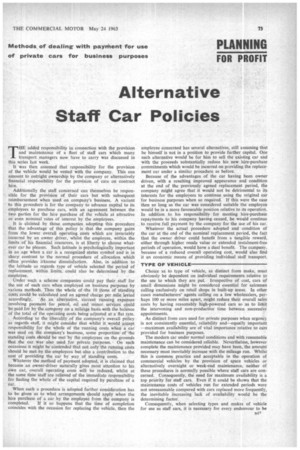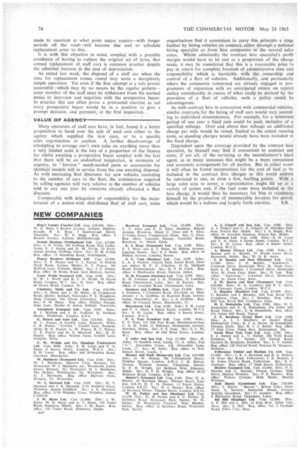Alternative Staff Car Policies
Page 75

Page 76

If you've noticed an error in this article please click here to report it so we can fix it.
THE added responsibility in connection with the provision and maintenance of a fleet of staff cars which many transport managers now have to carry was discussed in this series last week.
It was then assumed that responsibility for the provision of the vehicle would be vested with the company. This can amount to outright ownership by the company or alternatively financial responsibility for the provision of carson contract hire.
Additionally the staff concerned can themselves be responsible for the provision of their cars but with subsequent reimbursernent when used on company's business. A variant 'to this procedure is for the company to advance capital to its employees to purchase cars, with an agreement between the two parties for the hire purchase of the vehicle at attractive or even nominal rates of interest by the employees.
It is claimed by those companies adopting this procedure that the advantage of this policy is that the company gains from the lower overall operating costs which are invariably incurred by an owner driver, whilst the employee, within the limits or his financial resources, is at liberty to choose whatever car he pleases. Such latitude is psychologically important in an age when a car is a recognized status symbol and is in sharp contrast to the normal procedure of allocation which often provides irksome dissatisfaction. Also, in addition to the latitude as regards type of vehicle selected the period of replacement, within limits, could also be determined by the employee.
Under such a scheme companies could pay their staff for the use of such cars When employed on business purposes by various methods. Thus the whole of -the 10 items of standing costs couldbe calculated and an agreed charge per mile levied accordingly: As an alternative, current running expenses involving payment for petrol, oil and minor services: could be paid for by the company on a mileage basis with the balance of the total of the operating costs being adjusted at a flat rate.
According to the liberality of the company's overall policy as regards staff, it might consider that whilst it ,would accept responsibility for the whole of the running costs when a car was used on thb company's business, sonic proportion of the standing costs should be met by the employees on the grounds that the cars was also used for private purposes. On such occasions it might be contended that not. only the running costs should be met by the employees but also a contribution to the cost of providing the car by way of standing costs.
Whatever the method of payment adopted, it is claimed that because an owner-driver naturally gives most attention to his , own car, overall operating costs will be reduced, whilst at the same time staff are relieved of the immediate responsibility for finding the whole of the capital required by purchase of a car. .
When such a procedure is adopted further consideration has to be given as to what arrangements should apply when the hire purchase of a car by the employee from the company is completed. If it so happens that the time of completion coincides with the occasion for replacing the vehicle, then the employee concerned has several alternatives, still assuming that he himself is not in a position to provide further capital. One such alternative would be for him to sell the existing car and with the proceeds substantially reduce his new hire-purchase commitments which would be incurred on providing the replacement car under a similar procedure as before.
Because of the advantages of the car having been owner driven, with a resulting improved appearance and condition at the end of the previously agreed replacement period, the company might agree that it would not be detrimental to its interests for the employees to continue using the original car for business purposes when so required. If this were the case then so long as the car was considered suitable the employee would be in a more favourable position relative to its operation. In addition to his responsibility for meeting hire-purchase repayments to his company having ceased, he would continue to receive full payment by the company for the use of his car.
Whatever the actual procedure adopted and condition of the car at the end of the nominal replacement period, the fact that the owner driver could benefit from a tangible reward, either through higher resale value or extended instalment-free periods of operation, would have a dual benefit. The ccompany, because of a reduced overall operating cost, would also find it an economic means of providing individual staff transport.
TYPE OF VEHICLE Choice as to type of vehicle, as distinct from make, must obviously be dependent on individual requirements relative to the use to which they are put. Irrespective of cost, cars of small dimensions might be considered essential for salesmen calling exclusively on retail shops in built-up areas. In other cases manufacturers' agents calling on a few wholesalers, perhaps 100 or more miles apart, might reduce their overall sates costs by having reasonably high-powered cars so as to Erna the intervening and non-productive time between successive appointments.
As distinct from cars used for private purposes when urgency is not consistently essential, reliability and—equally important —maximum availability are of vital importance relative to cars provided for business purposes.
The modern car under normal conditions and with reasonable maintenance can be considered reliable. Nevertheless, however complete the maintenance provided may have been, the amount necessary must inevitably increase with the mileage run. Whilst this is common practice and acceptable in the operation of commercial vehicles by the provision of spare vehicles or alternatively overnight or week-end maintenance, neither of these procedures is normally possible where staff cars are concerned. Consequently, the need for maximum availability is a top priority for staff cars. Even if it could be shown that the maintenance costs of vehicles run for extended periods were not unreasonable compared with cars replaced more frequently, the inevitable increasing lack of availability would be the determining factor.
Consequently, when selecting types and makes of vehicle for use as staff cars, it is necessary for every endeavour to be 114
made to ascertain at what point major repairs-with longer periods off the road-will become due and so schedule replacement prior to this.
It is with this objective in mind, coupled with a possible avoidance of having to replace the original set of tyres, that annual replacement of staff cars is common practice despite the admitted increase in the cost of depreciation.
As stated last week, the disposal of a staff car when the time for replacement comes round may seem a deceptively simple operation. Yet even if the first attempt at a sale proves successful-which may by no means be the regular patternsome member of the staff must be withdrawn from his normal duties to interview and negotiate with the prospective buyer. In practice this can often prove a protracted exercise as not every prospective buyer would be in a position to give a prompt decision, and payment, at the first inspection.
VALUE OF AGENCY .
Many operators of staff cars have, in fact, found it a better proposition to hand over the sale of used cars either to the agency which supplied the new ones, or to a specific sales organization or auction_ A further disadvantage of attempting to arrange one's own sales on anything more than a very limited scale is the loss of a proportion of the licence fee whilst awaiting a prospective buyer coupled with the fact that there will be an undoubted temptation, in moments of urgency, to ." borrow" much-needed parts or accessories for identical models still in service from the one awaiting disposal. As with increasing fleet discounts for new vehicles according to the number of cars in the fleet, the 'commission required by selling agencies will vary relative to the number of vehicles sold in any one year by concerns already allocated a fleet discount.
Comparable with delegation of responsibility for the maintenance of a nation-wide distributed fleet of staff cars, some
organiZations find it convenient to carry this principle a stage further by hiring vehicies'on contract, either through a national hiring specialist or from hire cortIpaniesin the several sales areas. Whilst admittedly the contract hire specialist's profit margin would have to be met as a proportion of the charge made, it may be considered that this is a reasonable price to pay in return for complete freedom of administrative time and responsibility which is inevitable with the . ownership and control of a fleet of vehicles. Additionally, and particularly where the companies concerned are already engaged in programmes of expansion with an anticipated return on capital outlay considerably in excess of what couldbe derived by the provision of a fleet of vehicles, such a policy could be advantageous.
As with contract hire in connection with commercial vehicles, similar contracts for the hiring of staff cars would vary accord' ing to individual circumstances. For example, for a minimum period of one year a fixed sum could be paid, inclusive of a sPecified mileage. Over and above that mileage an additional charge per mile would be raised, limited to the actual running costs, as standing charges would already have been included in the fixed charge.
Dependent upon the coverage provided by the contract hire specialist, he himself may find it convenient to contract out some, if not all, of the servicing to the manufacturer's local agent, as in many instances this might be a more convenient and economic arrangement for all parties. But in either event it will often be found inconvenient for the cost of fuel to he included in the contract, hire charges as this could seldom be restricted to one, or even a few, fuelling points. With a large sales area to cover, a representative might fill up at a variety of points and, if the fuel costs were included in the hire charge, it would then be necessary for him to reimburse himself by the production of innumerable. invoices for petrol, which would be a tedious and largely futile exercise,. . S.E.
















































































































